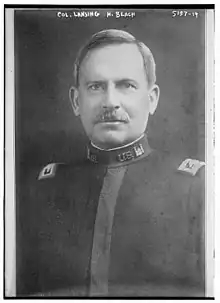Lansing Hoskins Beach
Lansing Beach (June 18, 1860 – April 2, 1945) was a U.S. Army officer who served for a time as Chief of Engineers.
Lansing Beach | |
|---|---|
 Beach in 1920 | |
| Born | June 18, 1860 Dubuque, Iowa |
| Died | April 2, 1945 (aged 84) Pasadena, California |
| Allegiance | |
| Service/ | |
| Years of service | 1882–1924 |
| Rank | |
| Commands held | Chief of Engineers |
Early life
Born in Dubuque, Iowa, Beach graduated third in the United States Military Academy class of 1882 and was commissioned in the Corps of Engineers.
Military career
Beach developed plans for the reconstruction of the Muskingum River locks and dams soon after Ohio ceded the state-built improvements to the federal government in 1887. From 1894 to 1901 he worked on public improvements in the District of Columbia, serving as Engineer Commissioner there in 1898–1901. As Detroit District Engineer in 1901–05, he oversaw harbor improvements as far west as Duluth. Beach supervised improvements along the Louisiana Gulf Coast in 1908–12 and in Baltimore in 1912–15. He also oversaw the entire Gulf Division in six of those seven years and the Central Division in 1915-20. In the latter capacity and as Chief of Engineers, he oversaw construction of the huge Wilson Locks and Dam on the Tennessee River. Beach also served on the Mississippi River Commission and the Board of Engineers for Rivers and Harbors. After his four-year tour as Chief of Engineers, he retired on June 18, 1924. After retirement, General Beach served as consulting engineer for various business interests in the United States and Mexico. He was President of the American Society of Military Engineers, and a member of the International Water Commission from 1924 to 1930.
He died in Pasadena, California on April 2, 1945.
References
This article contains public domain text from "Major General Lansing Hoskins Beach". Portraits and Profiles of Chief Engineers. Archived from the original on March 6, 2005. Retrieved August 26, 2005.
| Military offices | ||
|---|---|---|
| Preceded by William Murray Black |
Chief of Engineers 1920–1924 |
Succeeded by Harry Taylor |